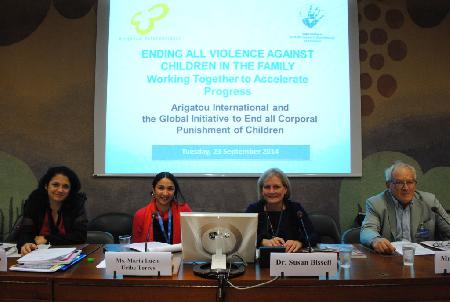On 23 September 2014 Arigatou International Geneva in collaboration with the Global Initiative to End all Corporal Punishment of Children hosted a side event during the 27th session of the Human Rights Council in Geneva, Switzerland. The event titled, “Ending All Violence Against Children in the Family – Working Together to Accelerate Progress,” aimed to discuss and identify concrete steps towards the acceleration of progress to end all violence against children in the family.
 The panelists included experts on the issue of violence against children: Ms. Elda Moreno, Special Assistant and Head of the Office of the Special Representative of the United Nations Secretary General on Violence Against Children; Dr. Susan Bissell, Associate Director, Chief of Child Protection, Programmes Division at UNICEF; Mr. Peter Newell, Coordinator of Global Initiative to End All Corporal Punishment of Children; and Ms. Maria Lucia Uribe, Secretary General of the Interfaith Council on Ethics Education for Children and Director of Arigatou International Geneva. The panel addressed the progress ending corporal punishment in the family, challenges, best practices and preventive mechanisms, including positive parenting.
The panelists included experts on the issue of violence against children: Ms. Elda Moreno, Special Assistant and Head of the Office of the Special Representative of the United Nations Secretary General on Violence Against Children; Dr. Susan Bissell, Associate Director, Chief of Child Protection, Programmes Division at UNICEF; Mr. Peter Newell, Coordinator of Global Initiative to End All Corporal Punishment of Children; and Ms. Maria Lucia Uribe, Secretary General of the Interfaith Council on Ethics Education for Children and Director of Arigatou International Geneva. The panel addressed the progress ending corporal punishment in the family, challenges, best practices and preventive mechanisms, including positive parenting.
Ms. Moreno discussed the important role of the family in the protection of children but also how families can become places where violence against children is often perpetuated and under reported. She emphasized the importance of promoting positive parenting as a public policy, ensure a comprehensive legal ban on corporal punishment in the family, investment in early childhood, support family and caregivers and develop strategic partnerships. She emphasized that preventing and banning violence against children in the family needs to gain leverage amongst the population.
Dr. Bissell discussed some of the findings of UNICEF’s new report, Hidden in Plain Sight, which contains data and statistical analysis of violence against children. An accompanying piece called Ending Violence Against Children: Six Strategies for Action, presents concrete evidence on what is working to address violence. Dr. Bissell further elaborated on the first strategy to support parents, caregivers and families and provided examples and good practices of programmes. She also highlighted the importance of implementing laws and policies to forbid violence against children.
Mr. Newell underlined the extraordinary anomaly of the persisting social and legal acceptance of violent punishment of children in the family and the low status of children as less than people and rights holders. Mr. Newell talked of the need of States to introduce laws on banning violence against children in the family. He referred to Sweden’s experience, as the first country to ban all corporal punishment of children. Mr. Newell highlighted some of the recommendations from a conference hosted by Sweden’s Ministry of Health and Social Affairs in Stockholm, June 2014, among them the need to raise the issue systematically in the Universal Periodic Review through questions and recommendations, raise awareness about the impact of corporal punishment, and advocacy to prohibit it from a variety of perspectives including gender and disability.
Ms. Uribe discussed direct, structural and cultural violence on children in the family and the importance of challenging cultural and religious norms that justify violence against children. She underlined the importance of addressing the issue from different perspectives and providing alternatives to parents to raise their children free from violence through positive parenting and sensitization programmes. Ms. Uribe introduced the initiative of Arigatou International, theWorld Day of Prayer and Action for Children, and presented an example from Cambodia initiated by UNICEF, Save the Children, Investing in Children and their Societies, and the Ministry of Cult and Religion, working with religious leaders to promote positive parenting.
The discussions with participants and panelists concluded that there is momentum to address violence against children in the family and that a global dialogue is happening among several sectors to prioritize the topic. The State needs to play a more crucial role in supporting families not only through education but also in other aspects, particularly those families affected by poverty or other structurally related issues. The role of the media was also emphasized to help spread information on the impact of violence against children in the family, and providing simple ways to educate parents on the negative impact of violence on children. It was expressed the need for more data collection and broader collaboration among different partners on the issue, along with including violence against children as an important aspect in the Post-2015 agenda.